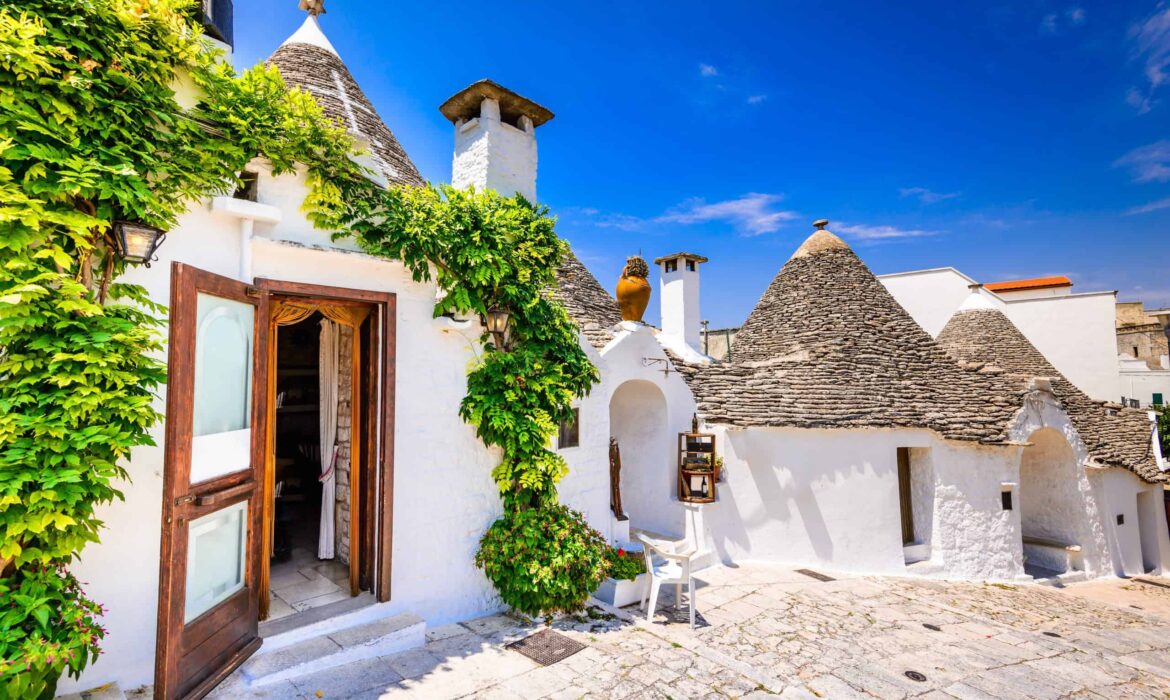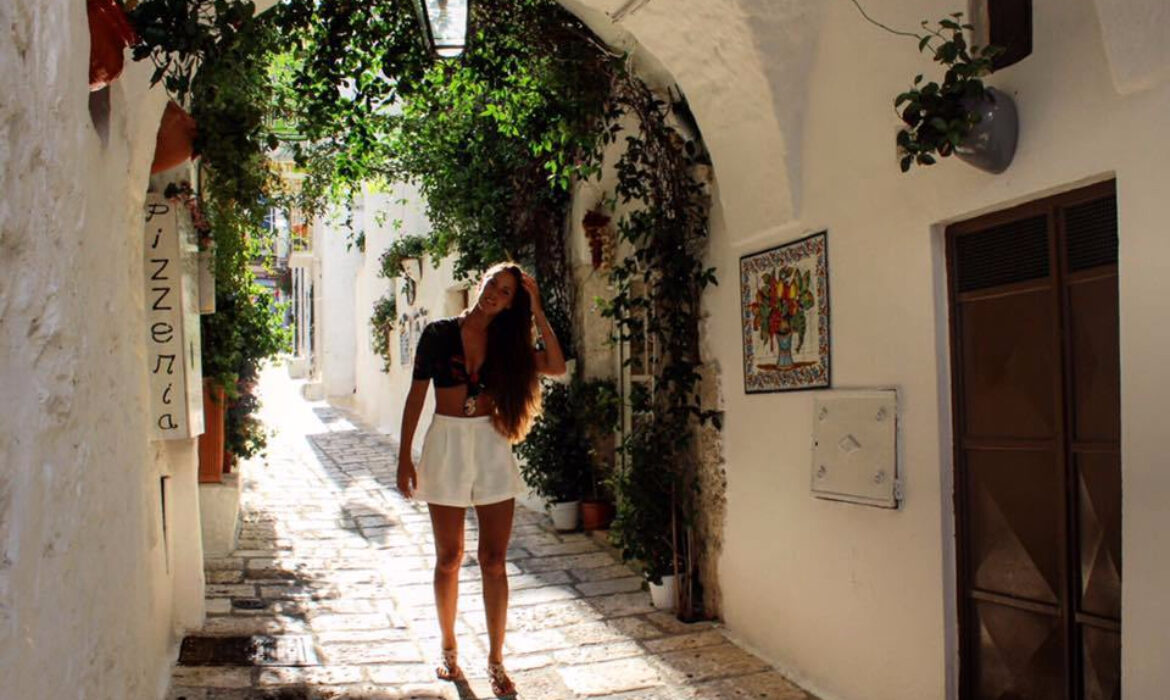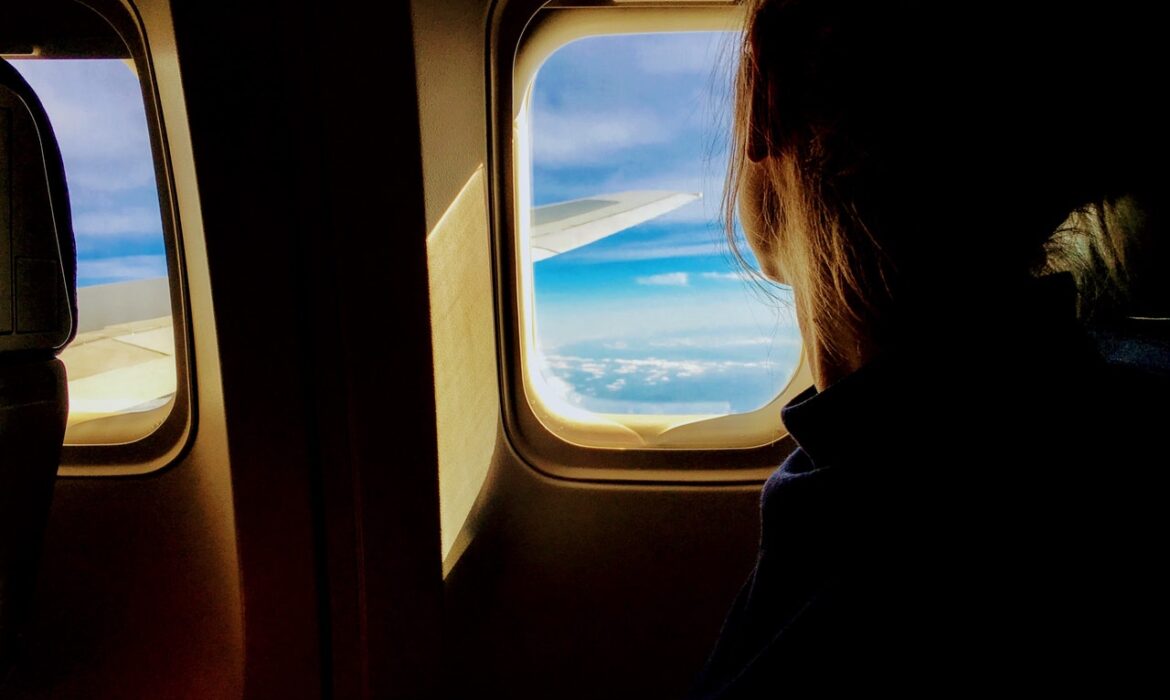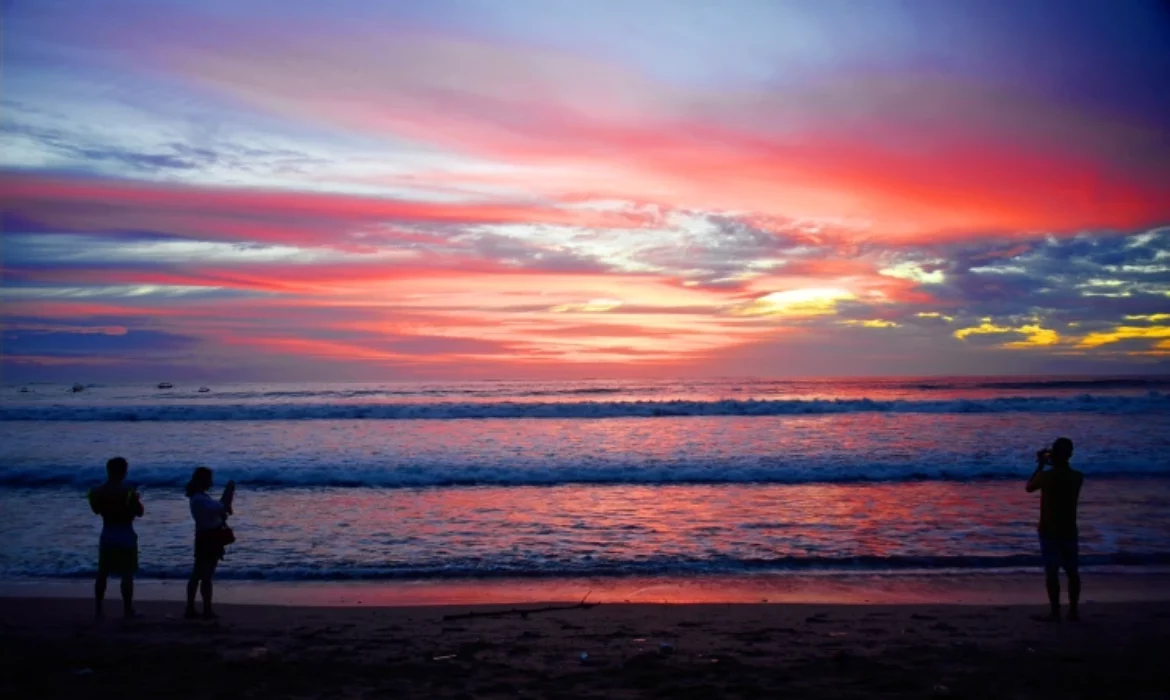Road to Apulia
You will recall our family adventures thus far on our summer journey to the south of Italy (see Road to Apulia 1 if you don’t). Well, from hereon-in our tale steps up a pace as we get down to the business of our Puglia vacation proper. It’s 09.30 in the morning and it has been a relatively short two and a half hour drive from our last night’s hotel at San Giovanni Rotondo and we will soon be approaching Alberobello.
The temperature is rising into the late-thirties as we leave the highway and coastal plains of the Adriatic to climb the olive-tree-clad, craggy limestone hills to an elevation of 300 or 400 metres. We traverse the yellow roads of the countryside through Acquaviva delle Fonti and Putignano. Everything changes in these small towns and villages. The racy 130 kph (140 if no-one is looking) speeds of the autostrada are left behind as we slow to a crawl. Traffic lights seem forever red (although many locals in the south consider them Christmas decorations and ignore them). It appears that at every turn in the road we will be held up by a crusty old Fiat Panda, or hiccupping tractor, both trundling along at under 30 kph.
Best to go with the flow – no chance of rushing – so just accept it. My eldest daughter in the front seat is battling to no avail to distract the youngsters’ attention with off-the-cuff quizzes and drawing competitions. Their chant of: “When will we get there?” is soon replaced by: “Daddy, will we ever get there?”. I’m beginning to believe the backseat trolls are mind-readers.
Hurrah! We’ve arrived! We’re staying as guests of the excellent Grand Hotel la Chiusa di Chietri set in olive-groves just outside Alberobello. This is one of those places that has the got the balance just right between authenticity and comfort. We use the property for Insight guests and it is always popular. Like my kids, they love its modern facilities, great pool, outdoor lounge at night and excellent kitchens.
Leaving the three little ones at the hotel with their big sister, I hightail it down to Brindisi to pick up my wife and our three-month old baby from the airport.
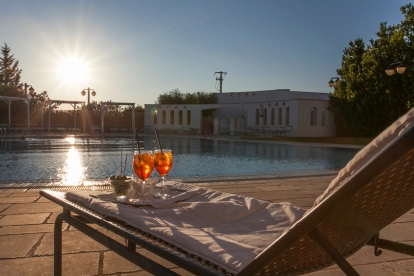
With no kids on board I can pace it up a little so I’m soon whistling past the agricultural traffic and delivery vans, through busy Locorotondo, and on to the picturesque white walls of Ostuni to then drop back down the steep hillside to rejoin the coastal highway further south.
’m driving right through the heart of the trulli region… so I’d better explain more…
The towns of Putignano, Ostuni and Martina Franca form a ‘trulli-triangle’ that is part of the Itria Valley, in the Murge area of Puglia.
A trullo (the plural is trulli) is a traditional Apulian dry stone hut with a conical roof. Their style of construction is capped by a pinnacolo (central pinnacle) and the buildings are often painted with simple Christian or other symbols.

Trulli were mainly built as shelters and storehouses or, as permanent dwellings by small proprietors or farm workers. Alberobello is the best example, as whole districts of the town contain dense concentrations of trulli, hence its popularity with visitors. The ‘golden age’ of trulli was the late 1800s, which was when the wine trade really developed in the region. Today, trulli are often sought by foreigners who snap them up and renovate to modern standards as holiday homes or rental properties.
With family now collected and gathered at the hotel, we spend an afternoon by the pool and head into Alberobello to explore its labyrinth streets. After taking our fill of the sights and sounds, with a stop in a corner cafe, we retire to Il Pinnacolo, a garden restaurant , to enjoy sunsets overlooking the city’s roofs.
It’s a pretty busy restaurant but we secure a table for all seven of us and the evening’s dining begins. Service is typically slow and relaxed, which is fine and the food is definitely worth the wait.
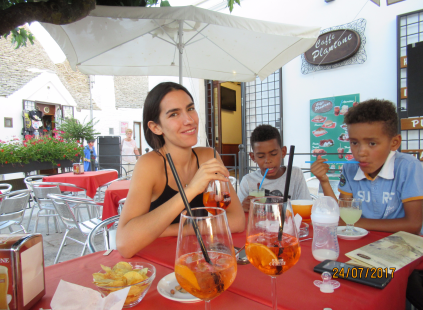
The thin-crust pizza and steaks were very good (kids’ seal of approval) but for me the best starter in Alberobello is the smoked sword fish and smoked salmon – perfection! Prices are great with a pizza coming in at about four Euros. Compare that to Switzerland. Not likely!
A nice bottle of local Verdeca wine and we’re sorted.
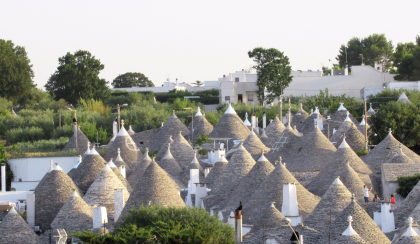
A new day dawns and we enjoy a typically local breakfast with fare that includes delightfully soft and spongy, custard-filled pasticciotto (little cakes), black olives, fresh salad and of course an array of delicious cheeses – including burrata (mozzarella with a liquid centre), ricotta forte (spicy ricotta), and my favourite, scamorza. This last one is a stretched curd cheese, hung to partially dry, and sometimes smoked. It is to die for.
Two strong coffees, pack the car and we’re off. Heading west across the peninsula for six nights in a seaside villa near Pulsano, on the Gulf of Taranto.
More to follow next time!
Footnote: My eldest is vegan but had no problem whatsoever finding suitable dishes wherever we went. While you’ll find amazing meat and fish dishes throughout Puglia, the region used to be very poor, so use of vegetables and simple cooking was always a mainstay. This heritage can still be seen in menu items throughout the region, which makes is a vegetarian or vegan paradise.
The Age of Personalisation
As any savvy marketer will tell you, personalisation is the new frontier. Online or offline, it’s essential for companies to provide customers with opportunities to do-their-own-thing.
It should be the Holy Grail for travel providers too, because holidaymakers increasingly crave experiences that engage them with their destination and the local people, as individuals, enjoying flexibility and freedom.
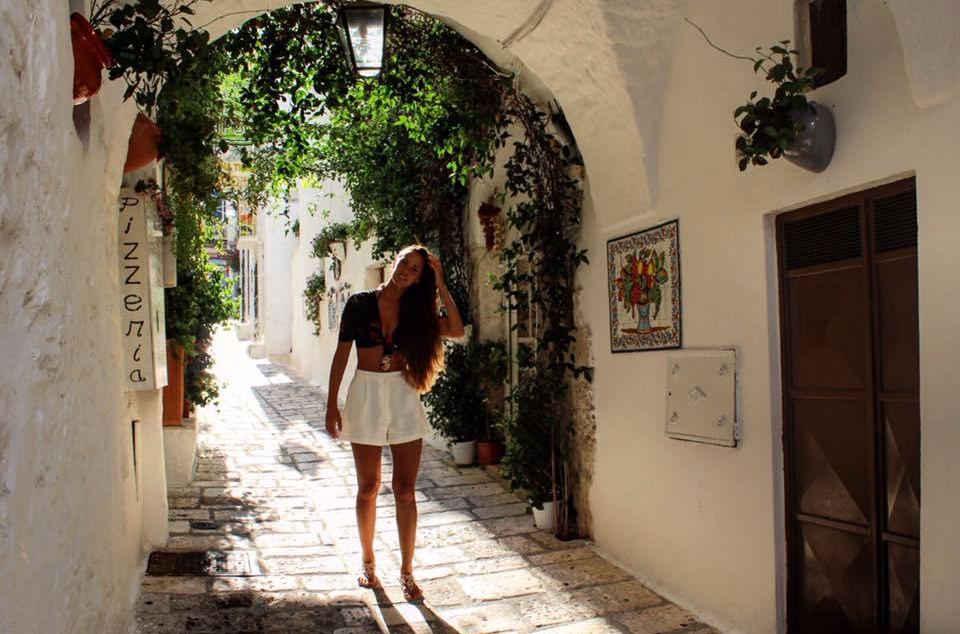
Today’s scenario
It’s easy to understand why this transformation of aspirations is taking place. At home consumers already have the expectation of personalised service throughout their daily lives, so on vacation it’s natural that they will increasingly want the same. More and more they are shunning over-organisation and turning to travel options that closely synchronise with their individual ambitions, dreams, and specific needs.
The impact of the internet
Independent-minded travellers also tend to take their counsel from peers and reviews, and conduct research online to seek out providers who meet their aspirations. It’s not about cost, they are making their decisions based on the concept of being able to better and more flexibly control their own experiences. This transition is being fuelled by the relentless and inevitable rise of online ‘local experience’ portals. These sellers are ever ready to roll out their virtual red carpets and supply bookable access to almost unlimited longtail independent traveller services.
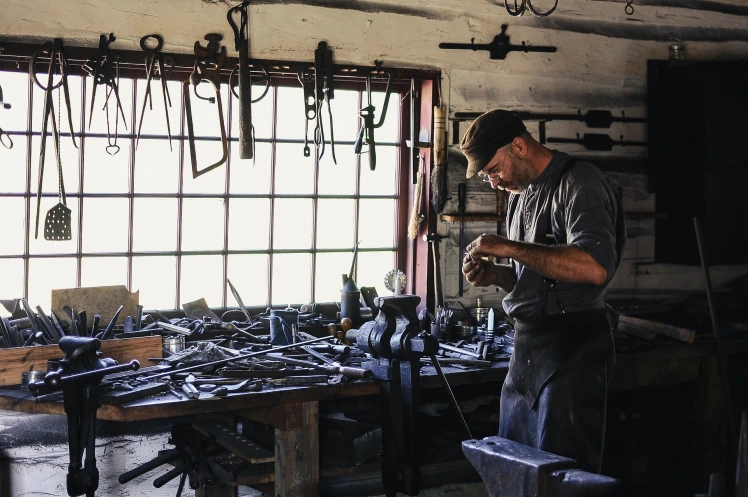
How to counter the threat
Many operators work to counter this threat by ensuring they provide plenty of ‘local experiences’ and ‘authenticity’. Nowadays however, particularly with the progress in technology, there is much more that can be done within a tour package to help guests personalise their experience.
One way is to provide useful digital or app-based information and recommendations for free time activities. Examples of the latest offerings include geo-locating hotels and pickup points to give confidence, recommending photo-spots, or featuring sponsors where guests can receive discounts for drop-in visits. Another idea is to add geotagged pop-up notifications for activity suggestions as they explore their surrounds; as well as providing ‘welcome home’ messages when customers return to their hotel or ship.
Nowadays, it is possible to provide fully navigable, self-guided walking or cycling itineraries with full auto-play audio commentary and stories from your local experts. Routes and contents can incorporate literally any style or interest you choose – from squares and fountains to gourmet tastings or wine cellars; and from countryside walks to fitness trails. It is even possible to provide digital codes for entry tickets or provision of contracted services at eateries, wine bars, local experience providers or sightseeing venues.
Beat Mountain View at their game
Of course, if you don’t provide guests with digital free-time assistance, the reality is that Google is ready and waiting to step in and fill the void; and they won’t be sharing with you the rich tracking data and trend analysis they get from your guest’s activities and movements. However, if you become the prime mover, providing the technology for your guests, then it is your business that will receive those invaluable insights into clients’ aspirations and behaviour, not Google. And this information will help you plan more effectively for the future.
Complementing not replacing your products
Like everything, life needs balance. The goal here should not be to replace your existing products, ground staff or tour directors with digital services, but to complement and supplement. Best of all, the app technology to allow personalisation is inexpensive, has no up-front hardware costs and gives a great marketing message. It is also true that uncluttering itineraries and providing free-time for personalisation not only satisfies guests themselves, but it saves you money too. And that goes to profits.
It’s a win-win situation
In summary, it’s a good idea to rethink the way products are constructed. Consider how to provide the technology that makes it simple for guests, occasionally, to individualise their vacation. Give them the time and space to create personalised encounters and immersive experiences here and there, within the convenience, security and comfort of your own expertly compiled vacation products. The cross-sell and upsell opportunities are countless, and your marketers and PR teams will have one hell of a story to tell. It really is a win-win situation.
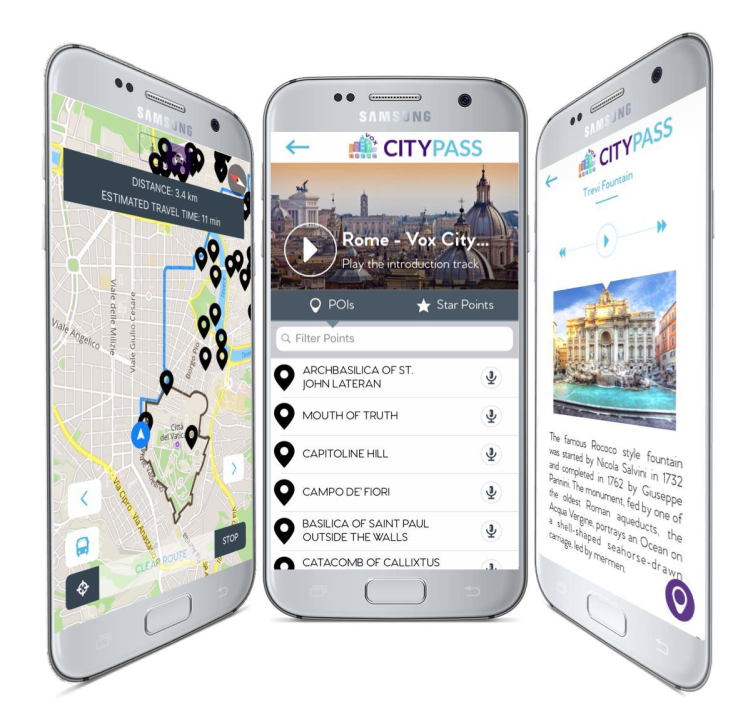
Other tourists are the pits and the joy of touring
‘Other tourists are the pits’ writes Jan Moir in the Daily Mail. Her take on this is that a vacation can easily become a horror story.
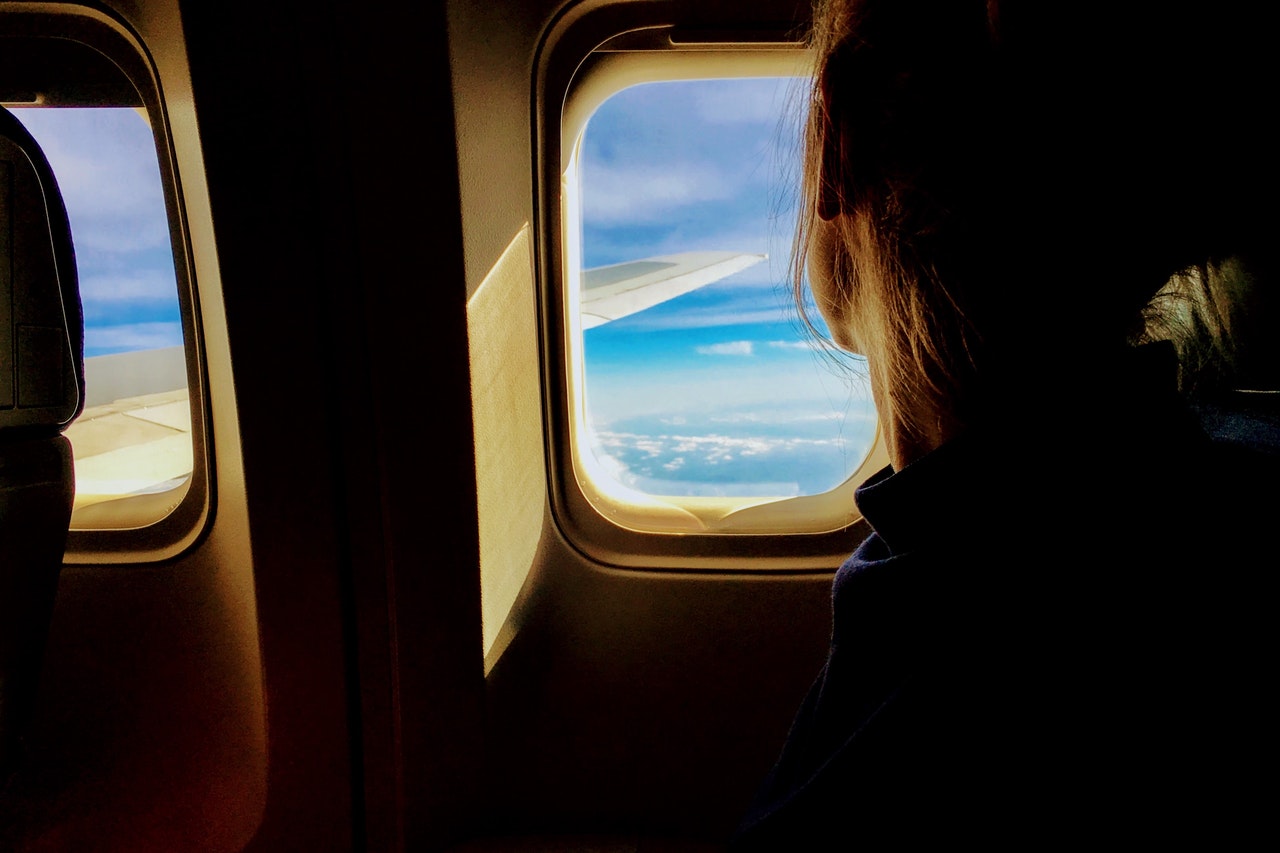
And in many ways she’s completely right. Holiday makers are often treated like cattle. You only have to type ‘holiday nightmare’ into search, as I did this morning, and you’ll pull up 29 million results. Crikey.
But it doesn’t have to be like that.
Admittedly, you’ll have to you have to get to your destination somehow and it is likely it will be on a plane. Air-travel is not what it used to be. Unless you have a private jet you are somewhat at the mercy of the cost-cutting accountants. Of course there are some fine, award-winning international airlines (and business class helps), but not everyone is travelling that way, so it pays to prepare for your flight and minimise the discomfort by getting ‘in-the-zone’. I covered this and other air travel tips in my earlier blog article ‘Travelling Well’. Zip back there for a refresher if you want to minimise the pain of your journey!
Lorem ipsum dolor sit amet, consectetur adipiscing elit. Ut elit tellus, luctus nec ullamcorper mattis, pulvinar dWhen you do eventually get where you are going, there are many choices of how you take your vacation – you’ve only got to read the classifieds or look online to gauge the sheer scale of vacation options on offer. If you want to really make the most of your hard-earned vacation time however and avoid the pitfalls, then your travel agent will help to sift through the mountains of detritus to find gold. That’s what they are there for.apibus leo.
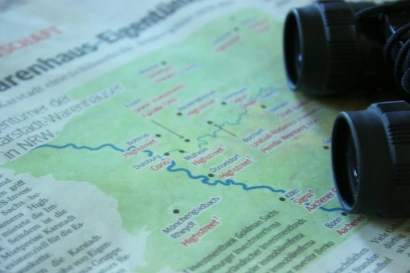
But I have a recommendation based on personal experience and insider knowledge. Now I know you’ll think me biased – because of my career of nearly 40 years has been in escorted journeys – but I can tell you a touring vacation is a seriously good option and it is really worth considering – even if it is just an entree to your broader trip or overall holiday experience. You’d be surprised just how much escorted journeys have changed these days and how good they really can be.
Let me tell you a couple of truths:
‘I’d never get on with a bunch of strangers’ is a common misconception. In actuality, guests on any given journey will generally have similar values and share common interests, because an escorted vacation acts as a highly tuned natural selector of like-minded people. Trips with reputable tour operators are carefully outlined, explained, curated and escorted so expectations will be consistently met or exceeded. Not many vacation types can carry that accolade. Guests choosing an upmarket tour, with five star hotels, quality dining and unique VIP experiences, will be travelling with others who selected the trip for largely the same reasons.

Price didn’t really enter the mix as a deciding factor. Those who choose a budget vacation will do so because it is a budget vacation, as will their travelling companions. The fact is that rich and meaningful, lifelong friendships are made through meeting others on a tour because of this commonality. You can’t say that about a week in a rental car.
‘If it’s Tuesday it must be Belgium’ as a descriptor of today’s escorted tours carries about as much truth as suggesting all British businessmen still wear bowler hats. In the sixties and seventies you could probably say yes on both counts, but not any more. Today’s trips can be very relaxed indeed, with real leisure time, shorter journeys and a slower pace with multiple nights in each destination built in right from planning stages. At Insight, we even introduced leisurely starts a couple of years ago, with departures no earlier than 09.00am. Guests want to get to know a place and its people properly and enjoy each local experience to the maximum; and today they will.
‘Location, location,’ I hear you chant: ‘I wouldn’t be seen dead on a tour as we’d be stuck miles out of town.’ It’s an understandable fear given some of the local market budget products out there, but it’s not true if you choose the right product. My team ‘always, always’ went for the best locations, and they are essential for the best experience. If you are staying at the right address, then you can step out of your door and be in the heart of the action. Let’s face it, if you are in the sticks you’re going to be landed with finding taxis or other transport to take you in and out of the city, often in rush hour traffic. That carries a really high additional cost as well as wasting your valuable time. It’s easy to check the hotel listings on your selected itinerary and your travel agent will confirm the best operator.
But I want to meet the locals…’ Well hello, we listened to that too… About five years ago Insight introduced the concept of in-depth local experiences on our holidays. These are opportunities for you to meet local people who’ll share their unique take on things. It is experiencing life as seen through their eyes. Sometimes they’ll be chefs or artisans, growers or designers. Other times they’ll be art experts or historians, lords or counts. One thing is certain you’d not get the chance to meet them personally or visit their establishments, kitchens and farms were you not travelling on a tour.
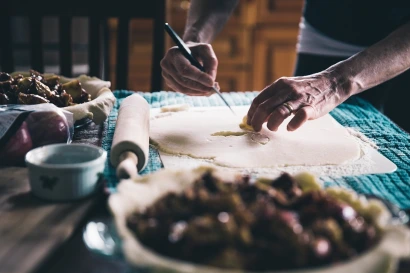
You’d never be invited to join them on private out of hours tours with unique access or join them for dinner in their own homes. It’s a massive change and quality escorted tour operators today are at the forefront of the travel industry. We are versatile and flexible.
Key to the mix of course is the travel director. They take care of all your vacation details, making sure everything happens effortlessly and ensuring the finest standards of service and quality. They’ll also make the introductions to these local experts and raconteurs and it’s eye-opening. If more people could experience things first-hand, in the way we do, would help rid the world of misconceptions and make all our lives that little bit better.
So, other tourists needn’t be the pits. Not on some vacations at least.
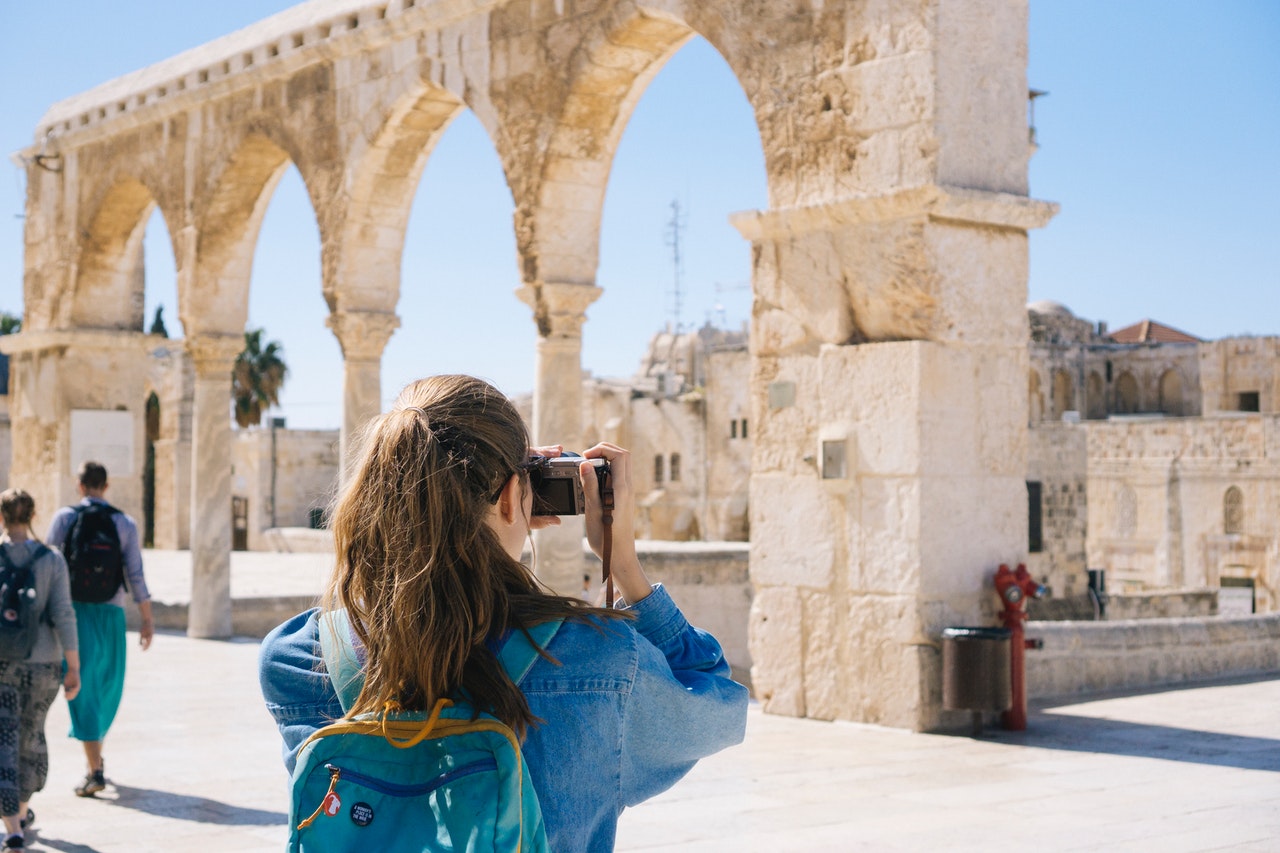
Let’s Head For The Bars in Bali
Most tourists love to watch the glorious Balinese sunsets from colourful beach bars at Kuta, or any number of other beach/horizon/bar combos, while clutching a nice cold Bintang beer or potent Arak Attack cocktail.
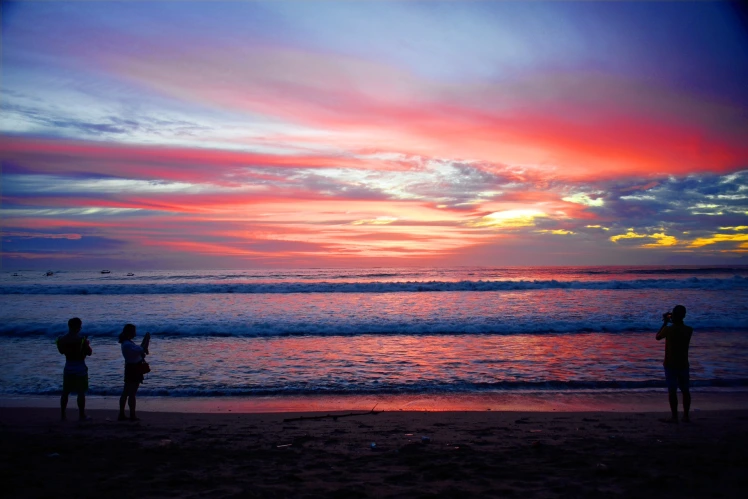
I read earlier this week that James Baker, an Aussie tourist, has committed himself to bars in Bali… for up to 12 years. That’s behind bars, by the way; and in an extremely grim Indonesian prison at that.
We’re not talking about cartels or mules with James. No, he’s just your average surfie guy whose mother almost certainly says he was always such a good, bright boy. Yet he took it upon himself to smuggle 28 grams of marijuana and some diazepam pills into a country that everyone knows has zero tolerance on drugs; and then told police he didn’t believe he was guilty because: ‘Well it’s legal in Australia, isn’t it mate’. Seriously, what’s wrong with the guy? Is he nuts? You’d imagine even a hermit would know that if you smuggle narcotics into Bali there’s a fair chance you will go down in a big way.
The media’s done its bit in warning global travellers. So has the Australian government. They even warn you on the airline when you come in to land: “Ladies and Gentlemen, Global Air would like to warn you that Indonesia (substitute Thailand/Singapore/China/Vietnam/Malaysia) has severe penalties for drug smuggling, including the death penalty.”

There are any number of cautionary tales about the perils of filling your boots (or any other personal space) with narcotics of any kind when you travel to exotic climes. Why did James ignore the dire stories about Lindsay Sandiford, Schapelle Corby and Andrew Chan? Has he been hiding under a rock? Didn’t he hear about the firing squads or the prospect of life in a hell-hole jail? Presumably, he thought he’d get away with it. Or maybe he fancied a good caning. Perhaps he simply didn’t care. Maybe he genuinely didn’t know.
It’s interesting therefore, that this is the International Year of Sustainable Tourism for Development. The World Tourism Organization (UNWTO), which is the body that came up with the concept, is trying to make a difference. It launched its campaign around the idea of ‘Travel. Enjoy. Respect’. It’s a worthy notion and it focuses on the contribution that sustainable tourism can make towards development of a destination. The travel industry is heavily involved and committed and the campaign even reaches out to consumers too. There’s a manual of tips to help travellers make responsible choices and have a positive impact on the destinations they visit.

The problem is that we industry types embrace these great ideals, but perhaps don’t always filter them down to the average global Joe or Jane.
I suspect most vacationers would have no trouble running solo with the first two words of the triptych, as evidenced by the sheer quantity of hedonistic ‘travel’ and ‘enjoy’ selfies on Facebook and Instagram, but my point is that somehow ‘respect’ is not a major enough part of the tourist’s lingua franca. Interestingly, I attended the European Tourism Association (ETOA) summit in Lucerne last week where the issue of increasing local resentment towards tourists in some destinations was also discussed and reinforced during one of the panel sessions, with tourist insensitivity to local life cited as one of the underlying factors.
I believe all of us in the travel industry: agents, operators, OTAs, airlines and NGOs, could and should support, promote and better explain the meaning and linking of the words ‘Travel. Enjoy. Respect.’ And we need to do so collaboratively across the industry and in a more relatable way at consumer level. We must all sing from the same hymn sheet.
Let’s get more engaged and more specific with travellers about the importance of sympathetically engaging with local communities, culture, environment and, yes, laws.
We’re too late to help James, and clearly not everyone wants to take advice, but maybe we can do a much better job of explaining how respect and enjoy go hand-in-hand (and in that order) when travelling. It’s good for everyone.
Post script:
Sad story. Last year I sat next to a guy on a Thai Airways flight from Hong Kong to Thailand. He was ‘half-trollied’ and was doing the ‘leaning over people’ gig, which in this particular case meant leaning into me. He was drinking heavily, from an open bottle of vodka, and repeatedly left his seat to disappear, with a very suspicious looking clutch bag, into the toilets with his girlfriend. The track-marks down his arm and blood-spotted tissues he returned with suggested they weren’t just in there to join the mile-high club.
The fact that the crew had to break down the door to get them out as the plane came into land didn’t bode well for their upcoming vacation plans either. Sure enough, they were greeted at the end of the gangway by a line of around nine police officers packing serious weaponry. I got the feeling that neither would be heading to their booked hotel any time soon.

